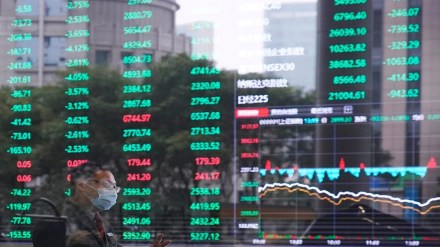The benchmark indices bore the brunt of heavy selling by foreign portfolio investors (FPIs) for the sixth consecutive sessions. Despite domestic institutional investors (DIIs) putting in an all-time-high single-day investment of Rs 13,245.12 crore, the indices fell by almost 1%. According to market experts, retail and high net worth individuals may also have started booking profits.
The sentiment was hit by multiple factors, including fund flows shifting to China, high valuations, geopolitical risks and potentially slowing earnings and economic growth momentum, experts said.
The Nifty and Sensex hit their lowest levels in around seven weeks, while the fear gauge, India VIX, hit a seven-week high of 15.08. While the benchmark indices fell close to 1% each, the broader market witnessed steeper cuts.
The Sensex ended the day 0.8% lower at 81,050 points and the Nifty fell 0.9% to close at 24,795.75 points. Monday’s losses took the indices nearly 6% off their lifetime-high levels that they had attained in the last week of September. Investor wealth declined by nearly Rs 26 lakh crore from record highs to Rs 452 lakh crore (approximately $5.28 trillion).
Meanwhile, key indices in South Korea, Hong Kong, Taiwan, Japan rose 1.5-2.0%, and the Euro Stoxx 50 was up 0.1% as of 1800 IST.
FPIs were sellers in India for the sixth session in a row on Monday as they took out Rs 8,293.41 crore worth of shares, as per provisional data, while DIIs bought shares worth Rs 13,245.12 crore, their highest-ever single-day buying. The sharp decline in the market despite aggressive buying by DIIs indicates likely selling by retail investors.
Aggressive stimulus measures announced by China have enthralled global investors. Global brokerage firm CLSA reportedly increased its weight on China and reduced the overweight exposure to India, and said India will underperform China equities for the rest of 2024.
“When we were at new highs, Fed had cut interest rates by 50 basis points. That was seen as good for emerging markets… But since then, we have had two big events – China stimulus measures and Israel-Iran conflicts,” said Andrew Holland, CEO of Avendus Capital Alternate Strategy. “Moreover, the latest job report in the US was very strong, and now there is a thinking that the Fed may not go aggressive on rate cuts. All the positives have kind of turned around.”
Domestic factors, too, played sentimental spoilsport. While robust domestic macroeconomic and earnings growth have provided comfort to equities so far, investors are now worried about a slowdown.
Nuvama Institutional Equities and Motilal Oswal Financial Services expect the earnings of Nifty companies to grow 2% year-on-year in the July-September quarter. This would mark the second consecutive quarter of slow earnings growth, and could lead to downgrades in price-to-earnings multiples.
“Corporate earnings, after four consecutive years of healthy double-digit growth, are moderating due to pressures from commodities and fading tailwinds from BFSI asset quality improvements. The earnings revisions have turned adverse with downgrades of approximately 6% in the Nifty EPS since July 2024,” Motilal Oswal said.
Concerns over valuations hit the broader market harder. The BSE smallcap index tumbled 3.3% while the midcap index ended 1.9% lower.
